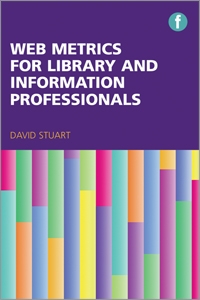
Primary tabs
You don't need to be an ALA Member to purchase from the ALA Store, but you'll be asked to create an online account/profile during the checkout to proceed. This Web Account is for both Members and non-Members.
If you are Tax-Exempt, please verify that your account is currently set up as exempt before placing your order, as our new fulfillment center will need current documentation. Learn how to verify here.
- Description
- Table of Contents
- About the author
- Reviews
The web provides an opportunity to collect a host of different metrics, from those associated with social media accounts and web sites to more traditional research outputs. This book is a clear guide and valuable tool for library and information professionals to the web metrics available and how to assess and use them to make informed decisions and demonstrate value. As individuals and organizations increasingly use the web to bypass traditional publishing avenues and formats, this book provides the tools to unlock web metrics and evaluate the impact of this content to others within the organization and beyond.
1. Introduction
Metrics Indicators Web metrics and Ranganathan's laws of library science Web metrics for the library and information professional The aim of this book The structure of the rest of this book
2. Bibliometrics, webometrics and web metrics
Introduction Web metrics Information science metrics Web analytics Relational and evaluative metrics Evaluative web metrics Relational web metrics Validating the results Conclusion
3. Data collection tools
Introduction The anatomy of a URL, web links and the structure of the web Search engines 1.0 Web crawlers Search engines 2.0 Post search engine 2.0: fragmentation Conclusion
4. Evaluating impact on the web
Introduction Websites Blogs Wikis Internal metrics External metrics A systematic approach to content analysis Conclusions
5. Evaluating social media impact
Introduction Aspects of social network sites Typology of social network sites Research and tools for specific sites and services Other social network sites General social media impact Sentiment analysis Conclusion
6. Investigating relationships between actors
Introduction Social network analysis methods Sources for relational network analysis Conclusions
7. Exploring traditional publications in a new environment
Introduction More bibliographic items Full text analysis Greater context Conclusion
8. Web metrics and the web of data
Introduction The web of data Building the semantic web Implications of the web of data for web metrics Investigating the web of data today SPARQL Sindice LDSpider – an RDF web crawler Conclusions
9. The future of web metrics and the library and information professional
How far we have come The future of web metrics The future of the library and information professional and web metrics.
David Stuart
David Stuart is an independent information professional, Bibliometrics Officer at the University of St. Andrews and an Honorary Research Fellow at the University of Wolverhampton. He has published widely in peer-reviewed academic journals and professional journals on information science, metrics, and semantic web technologies and is author of a number of books, including Practical Ontologies for Information Professionals (2016), Facilitating Access to the Web of Data (2011) and Practical Data Science for Information Professionals (2020).
"Will enable librarians to evaluate social media impact, web impact, relationships between entities on the web; and explore traditional publications in a new cyberspace environment. Of special note is Stuart's commentary on the future of web metrics and the library professional. A seminal work of impressive scholarship, Web Metrics for Library and Information Professionals is very highly recommended for practicing librarians in community, academic, corporate, and governmental library systems, as well as informational professionals charged with the responsibility for gathering, analyzing, interpreting, and reporting web metrics."
— Midwest Book Review
"Does Web Metrics for Library and Information Professionals provide a strong foundation for LIS professionals to explore the nature and potential of web metrics as a tool for building better web-based information services? The answer is unequivocally yes, and the book is recommended."
— Archives and Manuscripts
"...a very interesting book that covers a range of technical areas. For anyone interested in bibliometrics who wants to better understand how the web presents both challenges and opportunities to the information science community then this is a great introduction. The author is clearly knowledgeable about metrics and makes some useful connections between the applied and research worlds. Any information professional or student wanting a considered overview of some of the key metrics for providing information services in a digital world would be advised to read it."
— Elucidate


